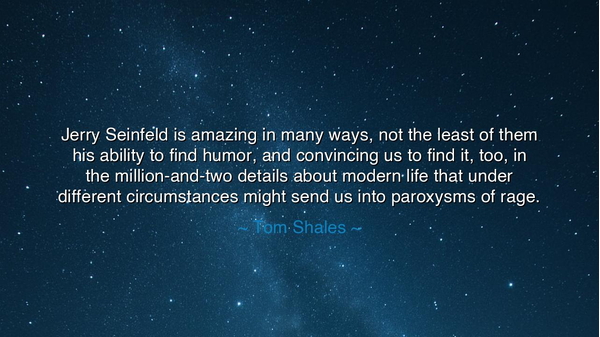
Jerry Seinfeld is amazing in many ways, not the least of them his
Jerry Seinfeld is amazing in many ways, not the least of them his ability to find humor, and convincing us to find it, too, in the million-and-two details about modern life that under different circumstances might send us into paroxysms of rage.






In the words of Tom Shales, “Jerry Seinfeld is amazing in many ways, not the least of them his ability to find humor, and convincing us to find it, too, in the million-and-two details about modern life that under different circumstances might send us into paroxysms of rage.”
This statement, though spoken in praise of a comedian, carries within it a wisdom far older than comedy itself — the power of humor to transmute irritation into insight, and anger into understanding. Shales does not merely celebrate Seinfeld’s wit; he reveals the sacred art of finding peace through laughter. For the world, in all its petty frustrations and ceaseless motion, often provokes rage in those who cannot see the absurdity behind its patterns. Yet, the one who can laugh — who can perceive the comedy of existence — becomes master of himself and free from despair.
To find humor in the details of modern life is to wield an ancient kind of magic — the alchemy of turning vexation into joy. From the endless queues, the broken machines, the misheard conversations, the mindless bureaucracy — all that might drive us toward madness — the humorist extracts gold. In doing so, he teaches us to look again, to look deeper. Jerry Seinfeld, in this sense, is a philosopher disguised as a jester. His stage is not Olympus, but the coffee shop; his lessons not about gods and kings, but about parking spaces and airplane peanuts. Yet in this ordinariness lies the profound. For it is in the trivial that life reveals its truth: that meaning is not found in grandeur, but in perspective.
The origin of this wisdom stretches back to the dawn of civilization. The Greeks, who birthed both tragedy and comedy, knew that laughter was the twin of sorrow. Aristophanes, the great comic playwright, made the citizens of Athens laugh at their own corruption, vanity, and folly — not to belittle them, but to heal them. He understood that the human heart, when burdened by rage or pride, can only be softened by humor. To laugh at one’s own absurdity is the first act of enlightenment. So too does Seinfeld, in the lineage of the ancients, invite his audience to see themselves clearly, not as victims of a maddening world, but as participants in its endless cosmic joke.
It is no small task to convince others to laugh where they would rage. This is not a gift of mockery but of mercy. To laugh at life’s frustrations is to rob them of their power. The one who can laugh at traffic, at bureaucracy, at the noise of modernity, is no longer enslaved by them. He has risen above them, not through denial, but through transformation. Shales’s insight reveals that Seinfeld’s genius lies not only in what he sees, but in what he allows us to see — the possibility that humor is a form of liberation.
Consider the story of Abraham Lincoln, who led his nation through civil war and unimaginable sorrow. Yet even in the darkest hours, he was known for his humor. When his advisors despaired, Lincoln would tell a story — not to trivialize the pain, but to restore perspective. His laughter did not erase tragedy; it gave him strength to face it. Like Seinfeld, though in a vastly different arena, Lincoln understood that humor is not escape — it is endurance. It is the light that flickers, however faintly, in the cavern of suffering.
The rage Shales speaks of — those “paroxysms of rage” born from the minutiae of life — is the fury of expectation. We expect order, and we find chaos; we expect fairness, and encounter absurdity. But the humorist teaches us acceptance without bitterness. To laugh at the chaos is to embrace imperfection, to find peace amid disorder. The wise have always known this truth: that life will frustrate us endlessly, but it can never truly defeat the one who can still laugh.
Thus, the lesson of Shales’s words is clear: seek humor where others seek complaint. When life irritates you — when the coffee spills, the train is late, the world feels senseless — look for the comedy that hides beneath the surface. Laugh not with cruelty, but with compassion; not at others, but at the shared absurdity of existence. For in laughter lies understanding, and in understanding lies freedom.
And so, dear listener, remember: humor is illumination. To find it is to survive. To share it is to heal. When next the trivial trials of life provoke your anger, think of Seinfeld, think of Shales, and smile. For the world has not changed — only your vision has. The wise do not rage against the absurd; they laugh with it, and in doing so, they find peace.






AAdministratorAdministrator
Welcome, honored guests. Please leave a comment, we will respond soon